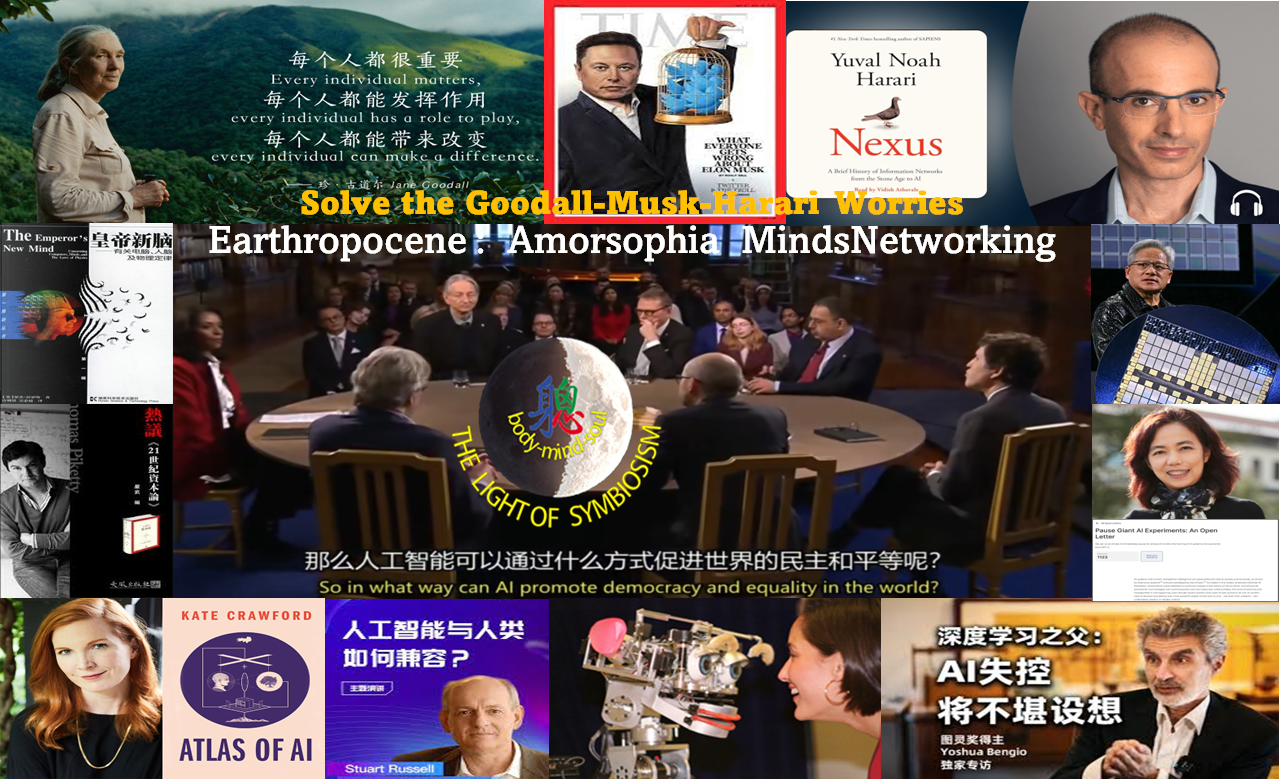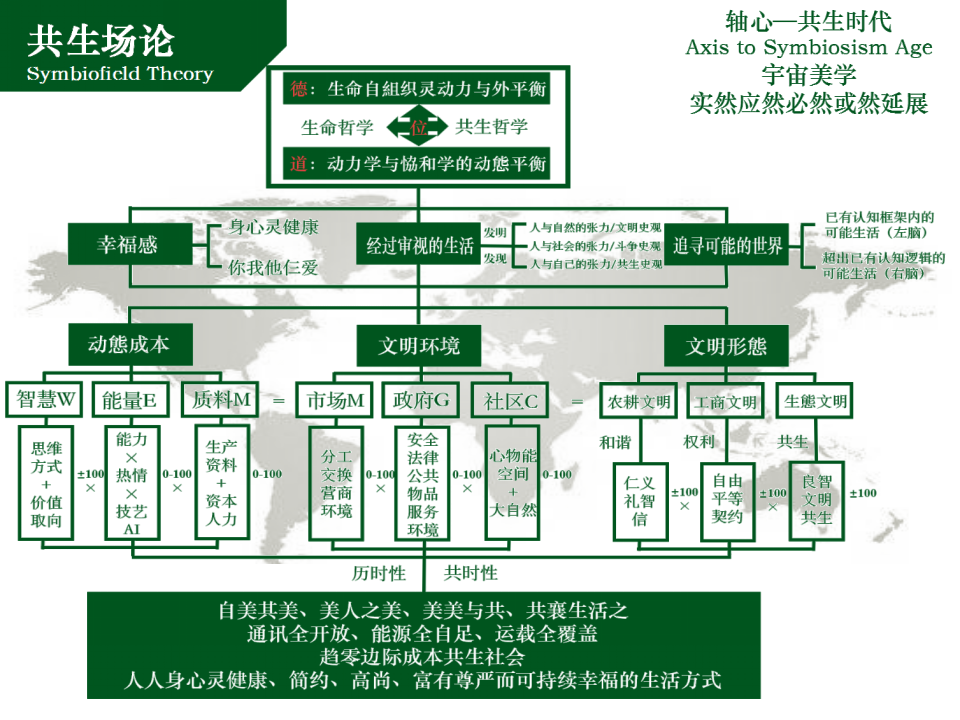Microtrends, New Variables
—Notes from the “International Symposium on Addressing the Uncertainties and Three Major Bottlenecks of AI’s Rapid Advancement”
At the beginning of 2025, under clear blue skies, a small-scale yet impactful symposium titled “Addressing the Uncertainties and Three Major Bottlenecks of AI’s Rapid Advancement” was held in a modest seminar room at the University of British Columbia (UBC).
The symposium was chaired by UBC blockchain expert Professor Zehua Wang, with Professor Hong Qian of the Global Symbiosis Society delivering the keynote address, Earthropocene: Amorsophia MindsNetworking. The presentation was based on insights from Professor Qian’s recent book, SYMBIOSISM: The Mind Power to Agree on An Innovative Life Style. Scholars from China and Canada participated in this closed-door symposium.
Key Discussions
Participants engaged in lively discussions on how to recognize, adapt to, and actively address the uncertainties brought by AI’s rapid development. Topics included the impact of AI on production and lifestyle paradigms established since the Industrial Revolution, its implications for workplaces, and the challenges AI poses to humanity’s longstanding self-centric perspective of seeing itself as the Subject and everything else as the Object.
The symposium also explored the “three major bottlenecks” AI faces in fully integrating into social life:
- The extreme asymmetry between energy consumption and efficiency;
- The inherent shortcomings of systems thinking in information sources, channels, and outcomes;
- The limitations of current AI methods, which rely on data, algorithms, computational power, and neural networks but fail to achieve the depth of wisdom, love, and consciousness embodied in Amorsophia.
A significant focus of the discussion was the rationale and prerequisites for constructing a “MindsNetworking” (孞联网). Following the Internet’s resolution of information asymmetry and the Internet of Things’ (IoT) automation of interconnected objects, MindsNetworking aims to establish an interaction mechanism that rewards or restrains based on intent, eliminating identity-based biases and fostering balanced coexistence between life and AI.
Three Imperatives and Two Practical Proposals
Professor Qian elaborated on three imperatives and two practical proposals:
- To move from the symbiotic origins of the Naturaropocene, surpass the symbiotic baseline of the Anthropocene, and embrace the symbiotic soul of the Earthropocene is imperative.
- To abandon the self-centric worldview of Subject and Object and adopt the philosophy of Intersubjective Symbiosism is imperative.
- To construct the Amorsophia MindsNetworking to balance the AI concerns raised by thinkers like Goodall, Musk, and Harari and to foster ecological and interstellar civilizations is imperative.
From these imperatives arise two proposals:
- Embrace the wonders and uncertainties of AI’s rapid progress with an open heart;
- Encourage engineers and philosophers to join hands, overcoming challenges together to construct the Amorsophia MindsNetworking and usher in the Earthropocene era.
The Power of Microtrends
As early as 1970, Mark Penn’s Microtrends highlighted the significance of small, emerging variables in shaping the future. The symposium echoed this idea, emphasizing that real change often stems not from grand trends but from the “microtrends” where new consensus and innovative actions are forming.
The ancient saying goes, “A gale arises from the edge of a tiny reed.” As a university student, I found the UBC International Symposium on Addressing the Uncertainties and Three Major Bottlenecks of AI’s Rapid Development deeply inspiring. Although it was a small, closed-door event, it embodied a new way of understanding our lifestyle through new thinking and new values—Microtrends!
The Future of Work and the Role of Artificial Intelligence
The consensus among the participants was clear: If AI, particularly humanoid robots, can replace most standardized, replicable, and intensive jobs, it will fundamentally solve the economic problem of resource scarcity. This breakthrough would bring the dream of Universal Basic Income (UBI) closer to reality.
More significantly, once scarcity ceases to be an issue, entrenched systems of capital monopoly, power manipulation, and their collusion will lose their relevance. Material privilege will no longer hold meaning. People’s perspectives on life will expand beyond material accumulation, prioritizing individuality, creativity, and the philosophy of “small is beautiful.” This spiritual pursuit is poised to shape the new framework of human society.
From this perspective, we must embrace humanity’s innate adaptability—the self-organizing and outward-balancing power endowed with Amorsophia. There is no need to fear that traditional industries and jobs will be replaced by AI and humanoid robots. Consider the Industrial Revolution: it disrupted countless traditional “rice bowls,” yet did it lead to societal regression or monotony? On the contrary, it dramatically improved overall living standards and brought vibrancy and diversity to human life.
Standardization vs. Creativity: Lessons from the Industrial Revolution
The Industrial Revolution’s advances in standardization, replication, and intensification significantly boosted productivity and material abundance. In just 300 years, it created more wealth than all prior generations combined. However, traditional crafts and agriculture were rendered vulnerable. Despite this, the Industrial Revolution still relied on a minority of individuals engaged in creative work in science, humanities, arts, and philosophy.
What about the AI era? AI will undoubtedly replace standardized, replicable, and intensive labor while also taking over some creative tasks. Yet, as Professor Zehua Wang pointed out, true creativity cannot be replaced by AI. Even certain non-standardized artisan crafts will remain irreplaceable.
The Real Challenge
The real issue is not whether AI will replace certain human jobs, but rather the uncertainties of AI’s rapid development and the bottlenecks in its evolution, which may lead to blind and harmful competition. These concerns are shared by today’s AI entrepreneurs, engineers, politicians, and ethicists.
This is why, following the construction of the Internet (to address “information asymmetry” caused by privilege, monopoly, and manipulation) and the Internet of Things (to automate interconnectivity among objects), humanity must now propose the creation of MindsNetworking. This network aims to address the problem of establishing symbiotic mechanisms of reward and restraint for cross-entity intent interactions.
Final Reflections
Finally, Professor Zehua Wang analyzed and addressed a pressing question from both engineering and mathematical perspectives: What happens when AI exhausts all publicly available information online and begins mining real-time, personally generated data?
In just ninety minutes, this vibrant and idea-rich closed-door symposium concluded with one shared belief: “Symbiosis is the future in progress, and AI will undoubtedly benefit humanity.
(Report by Yemili, a UBC student; Photography by Jianping Cao)






















您好!请登录
已有0评论
购物盒子